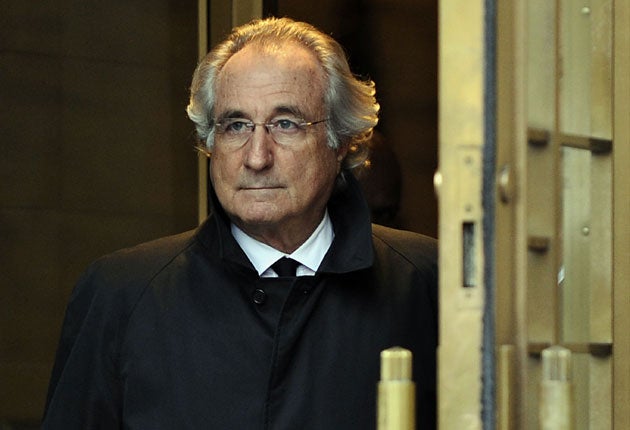Employing poachers is all well and good - if they’ve stopped poaching
Outlook

"What? Was Bernie Madoff unavailable?" That was the response of one wag to the news that Royal Bank of Scotland is to help the City of London Police with its efforts to combat financial crime.
That reaction is understandable when you consider the misdeeds we already know were committed by and at the bank. Not to mention the ones we’re about to learn about; the involvement of RBS traders in alleged attempts to fix the foreign exchange markets being your starter for 10.
However, there does appear to be a certain logic to the idea. RBS has purged most, if not all, of those responsible for the misrule at the bank in the run up to the financial crisis, when (as taxpayers know to their great cost) it was, in effect, a rogue institution.
Gone they may be, but the rogues’ activities are still ingrained in its corporate DNA and the people responsible for cleaning up after them ought to have learned valuable lessons from their work.
They are likely to have developed certain skills and competences that ought to be of considerable use to a police service involved in taking on economic crime. Like some of the hackers who end up helping institutions to beef up their internet security, RBS the poacher has moved into the gamekeeper’s camp.
Given the state largesse that this company has been in receipt of, you might very think this is one way that it could help to pay back the considerable debt it owes to every man, woman and child in this country.
However, there are also very good reasons for feeling a tad uncomfortable with the arrangement. RBS is still the subject of multiple regulatory probes, in addition to the aforementioned foreign exchange trading scandal.
Both sides have been at great pains to stress that the team-up won’t compromise any investigations into RBS. That wouldn’t have been a concern at all had they simply waited until those investigations were closer to their conclusions.
Moreover, this is more evidence of just how entwined this bank is becoming with the state. It has, for example, been assiduously hiring people from the governmental and regulatory ranks ever since its rescue. Its communications department has former government people in important roles. You’ll also find a large number of former regulators in its compliance function, too.
That’s true, to a greater or lesser extent of other banks as well. But they don’t have the complicating factor of having the Government as a majority shareholder and great care needs to be taken that the relationship between bank and state doesn’t become too incestuous. If it isn’t already. The Treasury Select Committee has repeatedly voiced concern about banks’ lobbying, perhaps with good reason. It is an activity that can be carried out informally as well as formally. This latest tie up might be one for it to run the slide rule over.
The new improved Ryanair will need to keep it going
City wisdom holds that, like any troubles, profit warnings comes in threes. For the new, supposedly cuddly Ryanair it seems that the reverse is true. Michael O’Leary’s airline has just issued its third profit upgrade in a matter of months.
The airline’s bravura run needs to be given a bit of context. The period it is comparing against was, after all, an exceptionally bad one featuring a couple of devastating profit warnings. They were caused by problems that were largely of Ryanair’s own making.
Mr O’Leary deserves some credit for having recognised this. There are plenty of similarly bumptious, if less publicity hungry, chief executives who wouldn’t.
As a result we have a new, simplified website, some sanity as regards hand luggage (you might be able to take a handbag on), even an apparently successful attempt to attract business customers.
If the numbers are anything to go by, it’s working. Perhaps too well for Ryanair’s longer term health. Mr O’Leary may have adopted a lower profile of late. The problem is that he really can’t help himself.
Hence his typically robust response to a Siegel+Gale’s 2014 simplicity index that rated only an insurance company – Axa – as being held in lower regard by customers. A silly survey, opined Mr O’Leary. Just look at our profits.
He’s right, they’re good. But the customer reviews posted (hilariously) on Ryanair’s own website clearly show that the airline’s problems haven’t entirely gone away. It appears that they’re just about willing to put up with the new, allegedly, gentler Ryanair because it can represent good value. And because it’s just about willing to put up with them.
A loss to Royal London and a loss to the City
There’s been an awful lot of change at Royal London of late, and not all of it for the better. The loss of Robert Talbut as chief investment officer is squarely in the latter category. Mr Talbut is one of those rare fund managers who understands the concept of stewardship. He’s been a public critic of some of the more excessive City pay deals, but at the same time he has also served as a doughty defender of the City itself.
Mr Talbut is a big loss to Royal London. He’s an even bigger loss to the City. It’s to be hoped that someone finds an outlet for his talents before too long.
Subscribe to Independent Premium to bookmark this article
Want to bookmark your favourite articles and stories to read or reference later? Start your Independent Premium subscription today.

Join our commenting forum
Join thought-provoking conversations, follow other Independent readers and see their replies